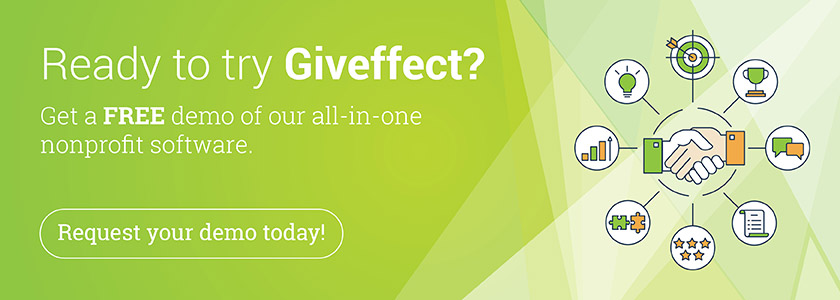The word automation sometimes has a bad reputation. To some, it means one-size-fits-all, cookie-cutter ideas that stifle creativity and can often end up with a sub-par result that looks just like everyone else. But nonprofit automation is about a lot more than that.
Smart nonprofit automation focuses on the elements that can take massive amounts of time, like data entry, and streamlines them to allow you to work on those creative ideas that can make a big difference.
Giveffect was built with “Smart Nonprofit Automation” as a core component of its design.
We develop a system that does the busy work for you: Email automation, integrated reports, system, and tool integration. And of course, as we mentioned already, automated data entry.
Let’s look at a big one for nonprofit automation, data entry. Many of us have spent hours entering data, often from one system to another to get cross-referenced reports. Giveffect does this automatically. For example, if anyone does an online donation or gift, registers for an event, fundraiser, or volunteer opportunity, signs a liability form, or something similar in the system… their data is automatically stored in the database and tagged under the correct relationship.
The database can store the same records for one individual in any or all of those categories under the same file. So you can see how many hours a person volunteers and if they recently gave a donation all under the same file. Or what events they attended. Or any liability or tax forms they have been sent or might need.
That centralized database brings us to the next huge nonprofit automation piece: automated reports. We have all this automated data that can instantly create and edit files, but what can you do with it? You can cross-reference the files by each category with our integrated reports system.
For example, you can find out how many people attended a certain event, like a holiday fun run. Then you can cross-reference that report to find out how many of those people volunteer or donate. You can find patterns among those who do donate more or volunteer more.
Another key part of nonprofit automation allows you to narrow or expand your inquiries..Perhaps you can run a report on women and find that over the age of 50 they donate more when they attend the fun run.
You can select a group of women over 50 that attend the fun run, and deselect those that are already donors and create a new group in the system. The new group can be targeted with emails to nurture them into a new donor stream.
Speaking of email, that leads us to another key automated system: the email operations. Not only can you easily create and use mailing lists inside the system, but also you can use a templated tool kit, with many professional options, to create great emails to contact that group.
Also in emails, you can automate tax receipts, emails, event confirmations, volunteer confirmations, and much more.
You can even build out a scheduling system that can track the number of automated emails that can be sent out in a certain order, creating a “funnel” or drip system to help create more donors, volunteers, and event participants.
All this nonprofit automation can be controlled without the need to import or export data. And, at least for my part, I would be Ok with never seeing another Excel export list again.
Even more nonprofit automated options can be used. Learn more about all the details:
